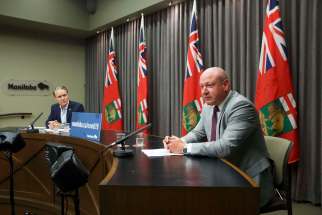Eligible workers waiting for COVID risk-recognition cash a month after province closed applications
Read this article for free:
or
Already have an account? Log in here »
To continue reading, please subscribe:
Monthly Digital Subscription
$1 per week for 24 weeks*
- Enjoy unlimited reading on winnipegfreepress.com
- Read the E-Edition, our digital replica newspaper
- Access News Break, our award-winning app
- Play interactive puzzles
*Billed as $4 plus GST every four weeks. Offer only available to new and qualified returning subscribers. Cancel any time.
Read unlimited articles for free today:
or
Already have an account? Log in here »
Hey there, time traveller!
This article was published 27/07/2020 (1649 days ago), so information in it may no longer be current.
A month after applications closed for a program recognizing workers who braved COVID-19 to provide goods and services to Manitobans, the heroes have yet to receive a single cent.
The province announced the $120-million Risk Recognition Program in mid-May and rolled out details on June 2, setting an application deadline of June 18. It later broadened the program’s scope, increasing the income threshold, and gave applicants until June 29 to come forward.
Government spokeswoman Andrea Slobodian said Monday the Finance Department is “working hard” to ensure payments are deposited in applicants’ bank accounts “as soon as possible.”
She could not estimate when the deposits might occur, but said, “It won’t be weeks.”
The Manitoba government says more than 90,000 people applied for the program. It’s still sifting through the applications.
Each applicant stands to receive about $1,300.
“The province continues to review the many applications received — this includes resolving errors such as incorrect data,” Slobodian said in an email to the Free Press.
“The review/follow-up process needs to be completed before (the) Finance (Department) deposits any funds, as it needs an exact count since the amount will be divided equally between eligible recipients. We want to do this once and do it correctly,” she said.
The federal-provincial program was announced in April by Prime Minister Justin Trudeau to top up the wages of low-income Canadians working in essential services during the pandemic. Ottawa provided $3 billion of the estimated $4 billion in program costs, with the provinces picking up the rest. Program details were left with the provinces.
Originally, Manitoba said it would make payments to part- and full-time employees who worked at least 200 hours in the 10-week period between March 20 and May 29 and earned no more than $2,500 per month. It later expanded the qualifying threshold to a total pre-tax employment income of less than $5,000 per month, or $12,500 in total during the 2.5 month eligibility period. Overtime pay was excluded from the calculations.
“The review/follow-up process needs to be completed before (the) Finance (Department) deposits any funds, as it needs an exact count since the amount will be divided equally between eligible recipients. We want to do this once and do it correctly.” – Andrea Slobodian, Government spokeswoman
Officials with two local unions, each with thousands of eligible members, say it’s unfortunate that the government couldn’t be more specific as to when workers can expect their payments.
“We are, of course, concerned about the delay. The bigger issue is the uncertainty — a timeline with an end date for a decision and… payment could have been communicated to the public and any applicants,” said Elizabeth Carlyle, national representative with the Canadian Union of Public Employees.
Jeff Traeger, president of UFCW Local 832, said he is not surprised there was some delay in getting payments out, considering the way the program is structured.
But he said workers should have been kept in the loop.
“I do think if government isn’t going to get their act together and get the money out tout de suite then they definitely should come out and tell Manitobans why it’s taking so long,” Traeger said.
Even though the UFCW leader was on the government’s advisory committee for the program, he has received no updates about the timing of payments.
“I’m hearing from you that ‘it’s not going to be weeks’ for the first time,” he told the Free Press Monday.
“I do think if government isn’t going to get their act together and get the money out tout de suite then they definitely should come out and tell Manitobans why it’s taking so long.” — Jeff Traeger, president of UFCW Local 832
UFCW Local 832 represents more than 17,000 members working in food production, food-distribution warehousing, grocery retail, hospitality, security, personal care and assisted living. It estimates more than half of its membership would have been eligible to apply.
Brianne Goertzen, a Child Care Coalition of Manitoba board member, said the program payment delay is “deeply troubling,” considering child-care workers “have gone above and beyond during the pandemic.”
“This is just another indication of the lack of respect for the child-care sector as a whole,” she said.
Child-care centres are stretched for cash and the province has been dragging its feet in guaranteeing necessary operating funds are in place to make sure they’re up and running at full capacity, Goertzen said.
larry.kusch@freepress.mb.ca

Larry Kusch
Legislature reporter
Larry Kusch didn’t know what he wanted to do with his life until he attended a high school newspaper editor’s workshop in Regina in the summer of 1969 and listened to a university student speak glowingly about the journalism program at Carleton University in Ottawa.
Our newsroom depends on a growing audience of readers to power our journalism. If you are not a paid reader, please consider becoming a subscriber.
Our newsroom depends on its audience of readers to power our journalism. Thank you for your support.









